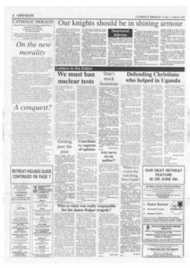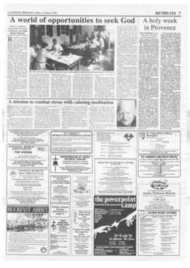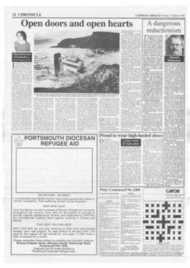Page 3, 12th March 1993
Page 3

Report an error
Noticed an error on this page?If you've noticed an error in this article please click here to report it.
Tags
Share
Related articles
Ofsted Prescribes Moral Lesson
Bishop Sees New Challenge In Inspection
Cardinal Elaborates Call For Commission On Family
Independent Back To Basics
Catholic Peeress Pledges Action To Arrest Falling Standards
No quick fix for morals
by Murray White
CATHOLIC education leaders this week warned the Government and its advisers not to attempt to solve society's ills by placing the whole burden of moral responsibility on schools.
Teachers and educationalists welcomed, in principle, plans to introduce "moral codes" in every school and give Religious Education a higher profile. But there was concern that deep problems in society would be too hastily tackled by superficial solutions.
The warnings came after the National Curriculum Council (NCC) announced plans to make schools draw up a moral prospectus. Education Secretary John Patten had set out the Government's stall on moral education last week when he called for RE to be given a higher profile. In a speech in Folkestone, Mr Patten announced that he intended to consult Church leaders on new model syllabuses for RE.
Bishop David Konstant of Leeds, who is chairman of the bishops' conference education department was "encouraged" that Mr Patten was giving RE a high priority, but warned that an equal commitment must be made by schools themselves.
"Where there is no commitment there will be no resources; if there is minimal staffing and no cash available in the school little can be done," said the bishop. Leaders of non-Christian churches should also be consulted, he argued.
Mark Philpot, Secretary of the Catholic Teachers' Federation (CTF), said that a moral code for schools was to be welcomed so long as consideration was given to moral education at home: "What seems to be missing here is that parents are the primary educators; we need a partnership."
Speaking after the CTF annual conference in Manchester last weekend which looked at the requirements for a "value-led curriculum", Mr Philpot warned that the biggest pitfall would be to turn RE into simply an academic part of the national curriculum. "You cannot test a 'value'. By doing so, you will not solve the problems of society, and you will create even more," he said.
Mr Patten had said he was considering the possibility of a national syllabus conference on RE with Church leaders, heads and teachers. The Government's new national curriculum and testing body, to replace the NCC next year, may be given the task of regularly consulting Churches on new RE syllabuses, said Mr Patten, "Too many pupils are leaving school without a strong enough sense of values. We must help them grow up with positive values at home and at school. RE must be at the heart of that process," he said.
The chairman of the NCC, David Pascal!, hopes to distribute a document that will prompt debate among teachers on ethics in the classroom. This would lead to "moral codes" which would inform parents about the values at the heart of each school.
Guest speaker at the CTF conference. Professor Brian Cox. warned delegates that in schools "values were being dissipated" by right-wing Government advisers more interested in the content of courses.
blog comments powered by Disqus













